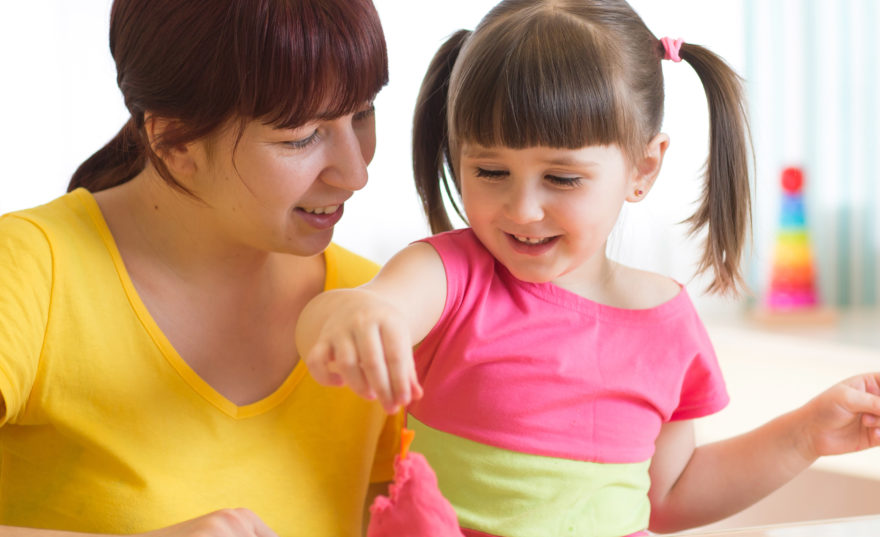This article is a summary of the paper published in JCPP – Latham, R. M., Mark, K.M., & Oliver, B. R. (2017). A harsh parenting team? Maternal reports of coparenting and coercive parenting interact in association with children’s disruptive behaviour. Journal of Child Psychology and Psychiatry, 58, 603-611. doi: 10.1111/jcpp.12665
Young children who display disruptive behaviour, such as fighting, temper flares, or oppositional and defiant behaviours, are known to be at risk of poor outcomes later in life such as adverse mental health, lower school achievement and delinquent behaviour. Because of this negative impact on the individual, as well as the associated burden for society, researchers are keen to understand more about how and why this kind of behaviour develops. Parenting has received a lot of attention over many years, with studies consistently showing that so-called ‘harsh’ parenting, which includes things like smacking, shouting at or threatening the child, can have a very negative impact on children’s wellbeing – including increased disruptive behaviour. Reducing harsh parenting and increasing awareness and use of more positive parenting approaches are therefore common foci for family interventions that aim to ameliorate these behaviours.
However, intervention can be very difficult. One reason is that other aspects of the family environment – not least other family relationships such as that between siblings or the parents themselves – interconnect with parenting, making things more complex. Coparenting is one such feature of the family environment. This term is used to refer to how parents work together in their parenting roles and there is some evidence that it is associated with children’s behavioural development. Commonly, people think of coparenting as describing a separated or divorced couple where both parties remain involved with parenting the child. Indeed much of the early coparenting research began with these families. But whether mothers and fathers work well or not so well together in their parenting is relevant for children’s wellbeing regardless of the marital status of the parents.
High quality coparenting refers to parents who show support for each other, share child-rearing values and cooperate with one another as they parent. On the other hand, low quality coparenting can involve things such as criticism of the other parent or actions that undermine a partners’ parenting attempts. Having parents who demonstrate high quality coparenting has shown important positive links for child outcomes, for example better child social skills and fewer behaviour problems. It has been suggested that high quality co-parenting may also act as a buffer, protecting children, for example, from parental criticism.
We were interested in understanding what role coparenting plays for children when there is harsh parenting happening in the home. Does high quality coparenting buffer children’s behaviour from the negative impact of harsh parenting?
The study involved 106 UK families of young twins where the mother and father lived together. Both parents took part in a telephone interview and completed questionnaires to tell us about their harsh parenting, their coparenting and their twins’ disruptive behaviour. The study was conducted during children’s transition to primary school as this is a key period for their socio-emotional development when family influences may be especially salient.
An important point to note is that we focused on mothers’ and fathers’ perceptions of their coparenting in order to capture their own thoughts about how they work together as a parenting team and how their partner makes them feel as a parent, rather than just what we might see as an observer.
Initially, we were surprised by what we found as it wasn’t what we expected! Instead of buffering children from their mothers’ harsh parenting, we found that high quality co-parenting, as perceived by mothers, intensified the toxicity of her harsh parenting, shown by increases in children’s disruptive behaviour over the 1-year study period.
For mothers who are using harsh parenting approaches, having a partner who they perceive as supportive and who makes them feel like a good parent and who shares their parenting values may not be such a good thing for children’s development. In this situation, high quality coparenting may reflect a family climate in which hostile interactions are deemed acceptable. By reinforcing, supporting or endorsing – either implicitly or explicitly – his co-parent’s harshness, the father may be demonstrating his tolerance of her harsh strategies to the children.
For these mothers, perceiving the quality of co-parenting to be low, protected children from developing disruptive behaviour. Here, ‘low quality’ coparenting could mean that the father is not supporting the mother’s hostility and may even be acting in ways that she perceives to be undermining – perhaps by telling her to stop. In doing so, the father reduces the children’s exposure to the mothers’ harsh parenting and may be modelling more appropriate behaviours, showing that hostile behaviour is not acceptable.
Until this study, it had been assumed that high quality coparenting would only ever be beneficial for children, but we highlight that it isn’t quite as simple as that. As the first of its kind, it is important for our study findings to be replicated, and to examine whether the pattern of these findings is similar at all stages of childhood and in all family types. There may be key implications of this research for intervention. The findings suggest that any attempts to increase parents’ support of one another and reduce coparent undermining through family intervention programmes, should be very careful to first consider, the parenting strategies that are being used in the home.
Key points:
- Parenting and co-parenting are both important for children’s development, but how these work together has been little explored
- Mothers’ perceptions of high quality co-parenting intensified the toxicity of her harsh parenting for children’s disruptive behaviour
- It is important to consider parenting and the co-parenting context together since a high quality co-parenting team may not always be ideal for children’s development
